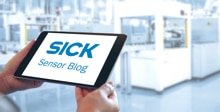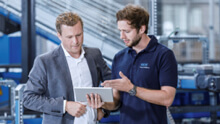Deep learning is one of the SICK presentation topics at the Hannover Messe 2019. The chancellor was personally very impressed with this and other aspects of the advancing Industry 4.0 applications. During the fair opening, Dr. Angela Merkel, together with Swedish prime minister Stefan Löfven, representative of this year’s partner country, paid SICK a visit on her traditional tour. Chairman Dr. Robert Bauer and board member and person responsible for Sales & Service, Dr. Mats Gökstorp, explained to the pair the significance of sensor technology for networking within the industrial value-adding process. At center stage were insights into the 4.0 NOW Factory in Freiburg via live stream and a deep learning application from SICK for the timber industry.

In Sweden, the wood sector is one of the most important branches of industry. That is why Stefan Löfven was particularly interested in a specific application of a deep learning process in the field of automation in the timber industry. Together with the chancellor, he had the chance to test self-teaching InspectorP camera sensors in use. German and Swedish developers at SICK refined camera sensors so that they can now detect the position of the growth ring and therefore the quality of the wood without having to undergo complex programming, all thanks to self-teaching algorithms and regardless of the respective type of wood. The new algorithms calculated and generated in this AI application in the cloud are made available locally on the sensor directly in the camera in a fail-safe manner.

Deep learning for logistics automation
The use case shown at the Hannover Messe is of course only one of many. Deep learning goes even farther and will penetrate even deeper into the areas of automatic detection, inspection and classification of objects or features in the future. And SICK is also continuously expanding its own deep learning sensor portfolio. With the implementation of deep learning in selected sensors and sensor systems, a new sensor software concept which creates adaptable and future-proof solutions for automation applications is also emerging in the SICK AppSpace. Image-processing sensors and cameras are also included in the coming products, which work with the new technology and whose customer-specific adaptation generates added value for the user. The concept of the sensor specialized with artificial intelligence can also be used principally on switching sensors such as inductive proximity sensors, photoelectric retro-reflective sensors, ultrasonic sensors and others.
SICK offers even more at the Hannover Messe
The German chancellor and the Swedish prime minister got additional insight into the SICK Industry 4.0 production in Freiburg. This was accessible to all visitors at the trade fair via live stream. SICK is using this live stream to show how it is successfully implementing Industry 4.0 in its own manufacturing processes in order to efficiently produce a wide range of optical sensor variants, no matter if they are ordered in batch size 1 or for large-scale production. Other important elements of Industry 4.0 were highlighted at the trade fair: Predictive maintenance, automated guided vehicle systems and localization technologies which make material flows visible and increase production quality were also presented at the SICK booth - for everyone.


